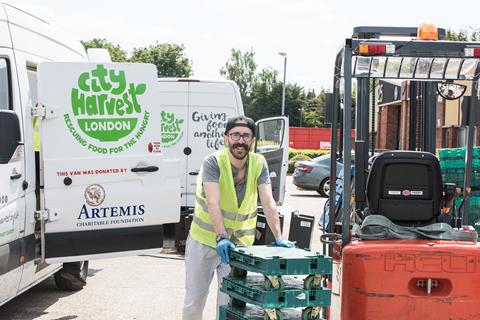
Defra has awarded £13.6m to charities to transform surplus farm produce unwanted by supermarkets into “healthy and nutritious” meals for millions of families in need.
However, it has emerged more than £1.2m of the potential central fund up for grabs is being withheld because a number of charities “failed to meet the criteria”. It has instead gone back into the government’s coffers.
In December, Defra announced a £15m fund to help tackle the scandal of food wasted on farms was to go ahead. Doubt had surrounded the scheme since it was first approved under Rishi Sunak’s government in February last year, but then fell into the Treasury’s “black hole”.
The fund was drawn up to fund redistribution of “healthy and nutritious” food from farmgate to homeless shelters, food banks and charities. It came after months of campaigning by FareShare for an annual £25m of funding, which it said would enable more than 40,000 tonnes of surplus food to be delivered to groups each year to improve the health of people living in poverty.
Farm food surplus
The last government failed to renew a £15m pilot scheme, first set up by former environment secretary Michael Gove in 2018, following The Grocer’s Waste Not Want Not campaign. It provided redistribution charities with funds to transport waste in the supply chain to prevent it being buried back into field, sent to landfill or sent to anaerobic digestion.
Today Defra announced its funding from the Tackling Food Surplus at the Farm Gate scheme would ensure more than 19,000 tonnes of surplus food waste was redistributed, with the money being awarded to 12 food charities across England after a bidding process.
Charities successfully bidding included FareShare, City Harvest and Food in Community.
Asked why the full £15m had not been awarded, a Defra spokesman said some bids had “failed to meet the eligibility criteria”, which The Grocer understands included strict guarantees over the ratio of the money going to food as opposed to charity overheads.
A small amount of the money – around £200,000 – had also been used as a start-up fund for the scheme.
“Like all departments Defra has a responsibility to spend taxpayers’ money wisely,” the spokesman added.
A source close to the process told The Grocer they hoped that while the money fell well short of what charties were originally asking for, it would be a chance for the redistribution sector to show how a relatively small fund from the government could transform food surplus.
More than 1,000 charities across the UK signed an open letter to former PM Rishi Sunak backing FareShare’s call for a £25m fund for surplus food. Polling found almost 90% of the public believed surplus food should be donated to people and charities, while just under 80% thought the government should do more to help.
A source said: “The hope is that charities will be able to prove how this money can transform food suplus.”
King Charles has also joined calls for an end to the scandal of farmgate waste, making it a focus of his Coronation Food Project.
Defra said its funding would be used to buy new vehicles, train volunteers and upscale storage facilities to tackle food poverty, saying the scheme would build on its Circular Economy Taskforce.
Reducing fresh food waste
Charities and redistribution partners who have been awarded grants include a bid led by FareShare and its network partners, including the Felix Project, which will receive more than £9.2m.
Food in Community, based in Devon, has secured more than £1.5 million to partner with local farmers and food producers to redistribute surplus food.
Meanwhile City Harvest, which delivers food surplus to more than 130,000 people a week, will benefit from more than £303,000.
Other successful bidders include The Bread & Butter Thing , The Cedarwood Trust and Feedback Global.
“This government’s Plan for Change is acting on food poverty and tackling Britain’s throwaway culture, ensuring more good food ends up on plates and not in bins,” said waste minister Mary Creagh.
“I am delighted to see this support go to 12 outstanding redistribution charities to form closer relationships with our hard-working farmers, and ensure their good food goes to those in need.”
Sarah Calcutt, CEO of City Harvest, said: “We grow a frankly amazing range of fruits and veg in this country, from berries to spuds and brassicas to salads. But the truth is, as any farmer will testify, a significant percentage of the food we grow will go to waste and the reasons for this waste are often around shape and size not meeting retailer specifications rather than anything to do with health or nutrition.
“This new funding will allow us to increase the amount of food we pick up directly from farms, reduce farm costs and increase further the amount of fresh food we can offer our customers.”
In a joint statement, Kris Gibbon-Walsh, CEO of FareShare and Charlotte Hill, CEO of the Felix Project, said: “This scheme will ensure the charities we support, including after-school clubs, homelessness shelters, and community groups, can access thousands of tonnes of fresh produce and transform it into meals and vital support to those who need it most.
“With demand for food at an all-time high, this scheme will significantly increase the amount of fresh, nutritious produce available, while decreasing food waste on our farms. We look forward to working with government, businesses and frontline charities to deliver this programme and support people in need across the UK.”
“The scheme will enable many more people across the region to access healthy, sustainable fruit and vegetables, and support a growing movement toward a more inclusive and environmentally regenerative food economy,” said David Markson, co-founder and director of Food in Community
“We hope to build a blueprint that will inspire other organisations and communities.”



















No comments yet